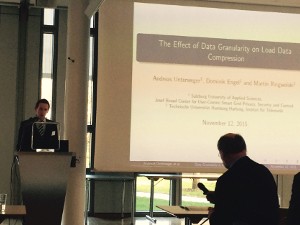 At the D-A-CH Energy Informatics 2015 conference in Karlsruhe, Andreas Unterweger presented the most recent results on compression of smart meter data. In the joint publication with Dominik Engel and Martin Ringwelski (TU Hamburg-Harburg), he analyzed the impact of data granularity on the compressibility of this data.
At the D-A-CH Energy Informatics 2015 conference in Karlsruhe, Andreas Unterweger presented the most recent results on compression of smart meter data. In the joint publication with Dominik Engel and Martin Ringwelski (TU Hamburg-Harburg), he analyzed the impact of data granularity on the compressibility of this data.
The compression of load profile data could play a big role in the smart grid in the future. Since every household in the future energy grid is equipped with a smart meter, which has to send and store load profiles daily, data compression can reduce the effort required for doing this.
The presented work by Unterweger, Engel and Ringwelski shows that not all data in all resolutions are effectively compressible. Furthermore, the additional computing power required by state-of-the-art smart-grid-specific compression algorithms has been analyzed. IT has been shown that the additional effort is more or less neglible, which allows for the practical use of these algorithms in the future energy grid.
The D-A-CH Engergy Informatics conference, a joint project of three countries, deals with ist ambitious goals to increase energy efficiency, reduce green house gas emissions and increase the portion of renewable energy with IT-based solutions.
Details on the conference: 4. D-A-CH Konferenz Energieinformatik
-
![[PDF]](https://www.en-trust.at/wp-content/plugins/papercite/img/pdf.png) A. Unterweger, D. Engel, and M. Ringwelski, “The Effect of Data Granularity on Load Data Compression,” Energy Informatics 2015, vol. 9424, p. 69–80, 2015.
A. Unterweger, D. Engel, and M. Ringwelski, “The Effect of Data Granularity on Load Data Compression,” Energy Informatics 2015, vol. 9424, p. 69–80, 2015.
[Bibtex]@Article{Unterweger15b, author = {Andreas Unterweger and Dominik Engel and Martin Ringwelski}, title = {The Effect of Data Granularity on Load Data Compression}, journal = {Energy Informatics 2015}, year = {2015}, volume = {9424}, pages = {69--80}, editor = {Gottwalt, Sebastian and K\"onig, Lukas and Schmeck, Hartmut}, pdf = {http://www.en-trust.at/papers/Unterweger15b.pdf}, publisher = {Springer International Publishing}, series = {Lecture Notes in Computer Science}, }